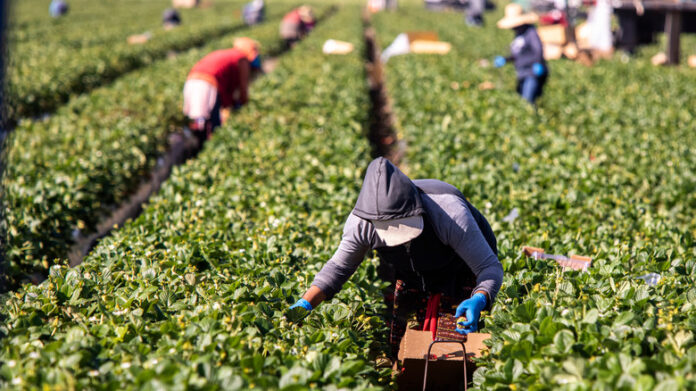
By Samuel A. Lopez – USA Herald
[CALIFORNIA] – As ICE ramps up its immigration enforcement, the agriculture industry stands on the brink of significant transformation. With Senator Dick Durbin recently revealing that 40% of all agricultural workers in the United States are undocumented immigrants, the implications for farming are profound.
Farmers employing large numbers of undocumented workers have likely been mismanaging their farms for years, as shown by their willingness to violate immigration and employment laws. Now, Durbin is appealing to the American public on behalf of the agricultural industry, claiming that the entire industry will collapse and making exaggerated statements like “say goodbye to the fruits we love” in response to Trump’s mass deportation policies. This is sensationalism at its finest.
But what happens to the industries affected by these policies? Agriculture’s backbone might bend, but it won’t break. Construction, hospitality, manufacturing, landscaping, and domestic services will feel the tremor. Yet, here’s where American ingenuity kicks in. We could reinstate student work permit programs starting in Junior High and High School, bringing vocational education back into schools, motivating our youth to join the workforce. Prisoners on work release programs, probation or parole could also fill these roles, giving them a chance to contribute while rehabilitating, much like we do in California with the Prisoner Firefighter Programs.
Now, about this narrative of exploitation — the data shows otherwise. Farm hands are making $18.00 to $20.00 per hour, construction workers around $27.50, and even in hospitality, the wages are fair, especially in California.
These workers often benefit from taxpayer-funded welfare programs, which means their total compensation package isn’t as bleak as some make it out to be. The jobs currently filled by undocumented individuals are ones I did as a younger man. While these jobs were tough at times, they were never beneath me. When push comes to shove, Americans will rise to the occasion.
The farmers crying wolf now about going out of business have only themselves to blame. They’ve misused the system for years, and now, with ICE’s enforcement, they’re facing accountability. The legal repercussions could be severe, from fines under the Immigration and Nationality Act (8 U.S.C. § 1324a) to potential criminal charges. And let’s not forget the insurance quagmire; if a farm has been employing undocumented workers, their coverage might be at risk.
Insurance Coverage: Insurance policies might exclude coverage for claims involving undocumented workers, and businesses could lose their coverage for business, automobile, and commercial general liability.
Immigration Reform and Control Act (IRCA): Enacted in 1986, this law makes it illegal to knowingly hire or continue to employ undocumented workers. Employers must verify the identity and employment eligibility of their employees by completing Form I-92.
Penalties: Employers who violate these laws can face civil and criminal penalties, including fines, imprisonment, and debarment from government contracts. For example, fines can reach up to $3,000 per unauthorized worker.
While ICE is not specifically targeting farmers, the sheer dependency on undocumented labor means that enforcement actions are poised to deeply impact the sector. However, amidst these challenges, there is a resilient spirit within America. If undocumented farmhands are detained or deported, Americans are ready to step in, leveraging their resourcefulness and ingenuity to keep the nation’s food supply chain robust.





